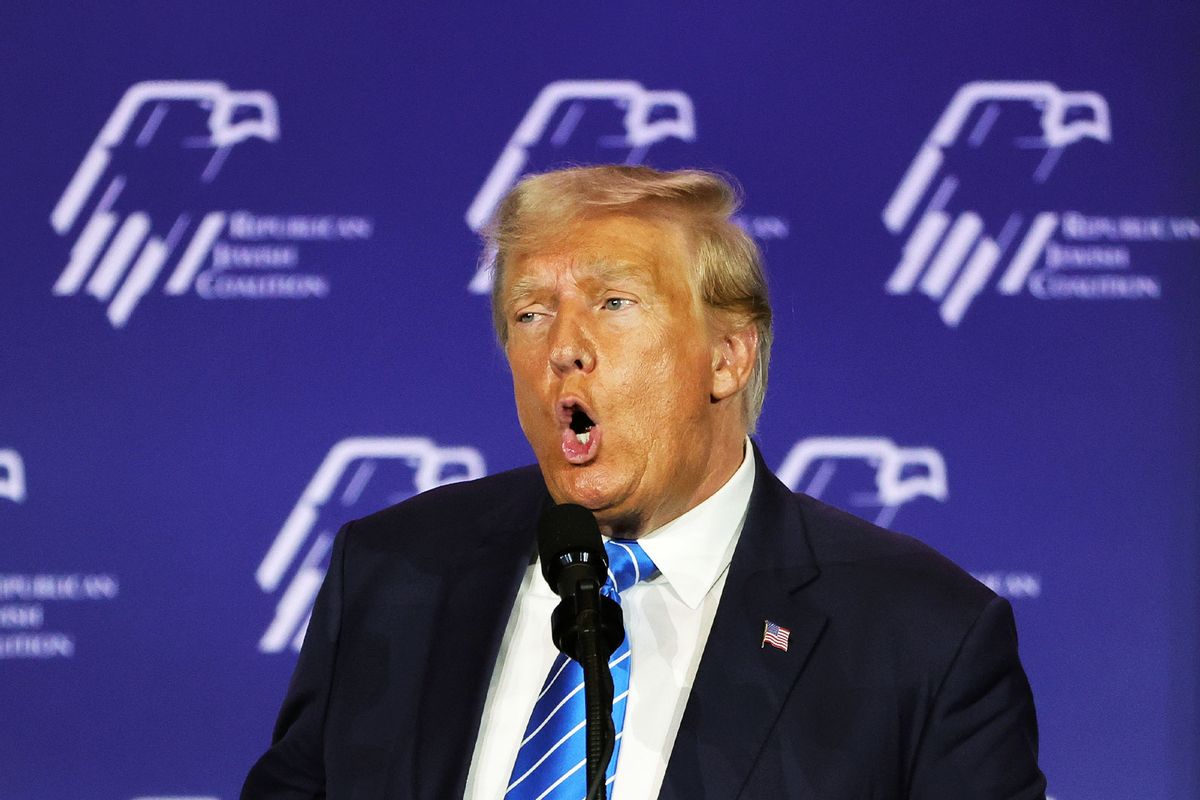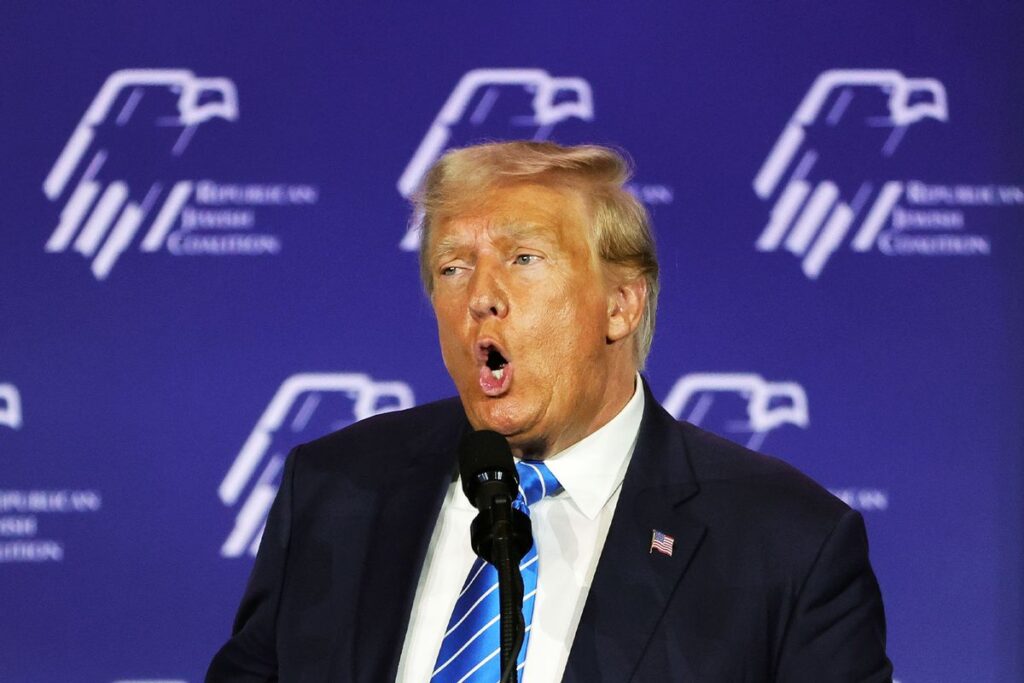
“There is no credible evidence that New York Jews are turning to Trump”
Donald Trump made antisemitic comments at a pair of Jewish-hosted events on Thursday. One might expect this to hurt his chances among Republican Jews, yet as historians explained to Salon, partisan loyalties may very well trump self-preservation among a substantial set of Jewish voters.
In his first Thursday speech, Trump falsely claimed that his Democratic opponent, Vice President Kamala Harris, supports “Hamas sympathizers, antisemites, Israel haters on college campuses and everywhere else.” Trump then proceeded to dabble in antisemitism himself. “In my opinion, the Jewish people would have a lot to do with a loss if I’m at 40%” support in the polls among Jewish voters, Trump argued to the Republicans assembled by Washington megadonor Miriam Adelson, ostensibly to oppose antisemitism. Trump either didn’t know or ignored the fact that Jewish voters have consistently supported Democratic presidential candidates with 60 to 80 percent of their voteshare since the 1970s (except when they turned against Jimmy Carter in 1980 for policies perceived as anti-Israel). He also did not cite any specific polling for his own claim to having 40% of the current Jewish vote.
“If I’m at 40, think of it, that means 60% are voting for Kamala (Harris), who, in particular, is a bad Democrat; the Democrats are bad to Israel, very bad,” Trump added. He then made another false claim, saying that Israel will be “eradicated,” “wiped off the face of the earth” and “cease to exist” if Harris wins the presidency. “It’s going to happen. It’s only because of the Democrat hold or curse on you. You can’t let this happen. Forty percent is not acceptable, because we have an election to win.”
Speaking at a separate event in New York later that day, Trump complained that he had not been “treated properly by voters who happen to be Jewish” during the 2020 election, most of whom supported President Joe Biden (the range of support varies from 68 percent to 77 percent depending on the survey). After incorrectly claiming to have been “the best friend Israel ever had” (a distinction that — at least among presidents — Jewish historians traditionally argue goes to the ones who helped recognize the Jewish state, Woodrow Wilson and Harry Truman), Trump asserted that because of his actions in canceling the Iran nuclear deal and mediating the Abraham Accords, “Jewish people have no excuse” to note vote for him.
Perhaps unsurprisingly, Harris’ husband, Doug Emhoff — who if Harris is elected stands to be simultaneously the initial First Gentleman and the first Jewish presidential spouse — denounced Trump on Twitter for fanning “the flames of antisemitism by trafficking in tropes blaming and scapegoating Jews. He even did it at an event purporting to fight antisemitism, no less. This is dangerous and must be condemned. We will not be intimidated and will continue to live openly, proudly, and without fear as Jews.” Yet even less partisan sources agree that Trump’s words are objectively antisemitic. Most notably the Anti-Defamation League slammed Trump’s words as having “undermined’ any efforts to combat bigotry by “employing numerous antisemitic tropes and anti-Jewish stereotypes — including rampant accusations of dual loyalty.”
“Trump frequently plays into harmful stereotypes and antisemitic tropes about Jews, suggesting we have dual loyalties or that we need our ‘heads examined’ because we support Democrats.”
“The statement is hideous, whining and divisive,” Hasia R. Diner, a historian at New York University who writes about Jewish issues, told Salon. “It is more than a dogwhistle to those who would harm Jews or Jewish institutions. It is a desperate plea but one that carries deep danger.” While some laugh off Trump’s words, they should think of “the bells it could set off, making them a sobering threat. Do we want to call that antisemitism, so be it. It is far more hateful to Jews, much more real and potent and disgusting than ‘Free Palestine!’ He may be cynical in using them, but his slavish followers are not.”
Despite the threat posed to Jews by Trump’s words, however, Diner doubts this will dissuade many MAGA Jews from abandoning their hero. “Are there Jews who will still vote for him? For sure,” Diner said. “They are so monomaniacally focused one issue alone, they will ignore the toxic and frightening language. Perhaps they will be the ones responsible for Jew-hatred.”
Jonathan Sarna, a historian at Brandeis University who also specializes in Jewish issues, explained how these voters can be so “monomaniacally” focused on “one issue alone,” as mentioned by Diner, in their support for Israel.
“I suspect they did not view [Trump’s comment] as antisemitic,” Sarna said. “I think they probably viewed it as ‘the facts of life’ because the wording was careful. These tropes that exaggerate Jewish power — as if Jews decide who the next president is — these tropes would probably be lost, especially on Israeli Americans, because the escalated language of that kind is more common in Israeli politics, and you’re obviously not as worried about the ‘fear of Israeli’ trope. And I keep stressing ‘Israeli’ because of course Miriam Adelson was born in Israel, and if you ever go to IAC [where Trump delivered his first speech], it’s called Israeli American Council for a reason.”
In earlier periods of American history, it is unlikely that even these pro-Israel Jews would have supported the Republican Party. In his classic 1969 monograph “The Emerging Republican Majority,” political strategist Kevin Phillips wrote off the then-predominantly northeastern Jewish vote as hopeless for Republicans because “whatever small strides the GOP may make in low-middle-income New York City neighborhoods filled with Jewish postal workers, storeowners and taxi drivers, the overall thrust of Jewish ballot behavior is clearly liberal, and there is little reason to expect Northeastern Jews to give substantial support to a Republican coalition with a Southern-Western-New York Irish base.” Sarna explained to Salon that “historically the extreme right wing in America was filled with antisemites and folks who today would be called Christian nationalists. Some were known supporters of Hitler; others (like right-wing supporters of Father Coughlin), are now known to have been in the pay of the Nazis, although most may not have known that.” Because the Republican Party could be easily linked to the extreme right by Democrats, Jewish voters backed Democratic presidential candidates with 75 percent to 90 percent of their votes in every election from 1932 to 1968 (save the two, in 1952 and 1956, when Republicans nominated a moderate, the popular war hero General Dwight “Ike” Eisenhower).
“Post-war, however, most people on the right distanced themselves from antisemitism,” Sarna explained, “Young conservatives like William Buckley were particularly forceful in their effort to purge antisemites and to appeal to a broader constituency. As neoconservatives rose, that seemed like a wise strategy; so-called paleoconservatives were marginalized.” These Jewish conservatives were especially attracted to the modern Republican Party’s unabashedly pro-Israel stances, which put it in contrast with a Democratic Party whose humanitarian impulses caused occasional criticisms of Israel’s atrocities. For this reason, they may not recognize that Trump is resurrecting a different and hoary form of Jew-hatred.
“Mr. Trump, though, has re-engaged with the once marginalized antisemites and dismissed the neoconservatives as well as folks like the Cheneys and Bushes as RINOs,” Sarna said. “The 2024 election, among many other things, will determine the future of Conservative politics in America, whether it will return to the bad old days of embracing Nazis and other antisemites or not.”
Susie Stern, chair-elect of the Jewish Democratic Council of America and a prominent New York Jewish Democrat, is optimistic that American Jews as a whole are wise to Trump’s ways.
“The polling cited by Trump was based on a very small sample,” Stern explained. “There is no credible evidence that New York Jews are turning to Trump. We are confident that across the country, 70% of Jewish voters will support Kamala Harris.” Certainly Trump’s recent diatribes against Jews may help him do so.
“Trump frequently plays into harmful stereotypes and antisemitic tropes about Jews, suggesting we have dual loyalties or that we need our ‘heads examined’ because we support Democrats,” Stern said. “These comments are blatantly antisemitic, embolden extremists, and normalize hatred and intolerance from elected officials. Trump reduces Jewish identity to political talking points, weaponizing antisemitism rather than addressing the rising antisemitism in his own political party.”
This does not mean that the left cannot have antisemites. As Diner pointed out, “there are no doubt individuals on the left —also and maybe more diverse and diffuse — who see Jews as inherently and fundamentally problematic and might be understood to engage in antisemitism.” Yet unlike the Christian nationalists and many of the other extreme right-wingers backing Trump and the modern Republican Party, “their religion or race or identity are not foregrounded. They do not define themselves as the true bearers of the nation. Most on the left — nearly all — may see deep flaws in the State of Israel, define it as guilty of genocide, colonialism and racist, but that does not make them advocates of antisemitism or spokesmen of it. Their views are political and not based on antipathy to Jews.”
The dark irony is that many Trump-supporting Jews, because they mistakenly see criticism of Israel as antisemitc, are ignoring the real menace: “To do so ignores the threat from the white, nationalist Christian right,” Diner said.
Read more
about politics

